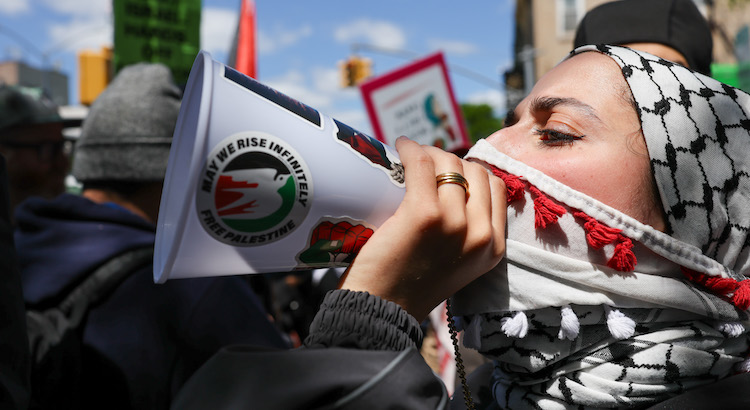A leading U.S. pro-Palestinian organization may finally be forced to reveal how thin the line is that separates Hamas from some of its boisterous advocates in the West.
The group is American Muslims for Palestine, and a federal judge in Virginia has ruled that it must turn over key financial documents requested by Virginia’s attorney general, Jason Miyares. AMP has come under investigation and been the target of several lawsuits since Oct. 7, though as Jewish Insider has pointed out, one in particular stands out.
In 1996, David Boim was murdered by Hamas terrorists in Jerusalem. A group called the Islamic Association of Palestine was found liable for his death. That group shut down and essentially reappeared as AMP, the Boim lawsuit argues. If the Boim’s lawsuit can demonstrate that AMP is functionally a reanimation of IAP, it should inherit IAP’s liability to the Boims.
The evidence presented in the Boim case highlights the extent of the threat from groups like AMP, which has been active in supporting the tentifada protests on campus post-Oct. 7. Together, the Boim case and the Miyares investigation might answer two key questions: How close are Palestinian advocacy groups to Palestinian terror groups? And how interchangeable are the many iterations of these groups? As long as the courts are able to force these groups to fully comply with transparency rules, it will be like putting the massive, radical pro-Palestinian network in the U.S. under an X-ray machine.
As JI explained: “Among other close parallels cited by Schlessinger, top officials at AMP — many of whom have ties to Hamas — were once affiliated with IAP, in what he characterized as a ‘dramatic’ overlap of leadership. When AMP formed soon after IAP had shut down in 2004, for instance, ‘the key player in the day-to-day functioning of AMP was the same guy who was the key player in the day-to-day functioning of IAP,’ he said, referring to Abdelbaset Hamayel, a former top IAP official who also served as AMP’s first executive director and still manages its books and records.”
The Boims’ attorney has also argued that “AMP had quickly established itself as a formidable organization with widely attended conferences and a deep reserve of institutional resources because it ‘inherited’ IAP’s business and operational methods as well as email lists, donors and convention speakers. AMP, Schlessinger notes, held a convention immediately after its launch in the same location in Illinois that IAP hosted its events, which he views as a key early reference point for establishing how the two groups are identical in all but their names.”
There’s another reason the Boim suit, in particular, is noteworthy. It may let the public see what law-enforcement officials have known about cutouts and front groups that pose as innocent nonprofits. For example, a founder of AMP has also been listed in previous court documents as a co-founder of Students for Justice in Palestine, the pro-Hamas group behind much of the organized anti-Semitic incitement on college campuses.
As this proliferation of acronyms suggests, obfuscation is part of the point. By having the same key figures behind each offshoot while repeatedly closing some groups and opening new ones, they produce an alphabet soup that quickly makes the public’s eyes glaze over. The tactic can enable them to escape legal accountability as well, as the Boim case shows.
And the chain of custody is important. Mousa Abu Marzouk, a top Hamas official, co-founded IAP. If the two groups are essentially the same product, the line connecting them goes back to senior Hamas figures.
Lastly, there is the obfuscation even under oath. An AMP board member, Salah Sarsour, spent eight months in an Israeli prison for his Hamas support, where he shared a cell with a Hamas commander. Is Sarsour aware that his cellmate, the Hamas commander, was even a member of Hamas? “I don’t know,” he responded in a deposition, a frankly absurd claim. Rafeeq Jaber is the former president of IAP. Jaber went on to do work for AMP, as established by documents surfaced during the case. Yet Jaber maintains that he has had no official involvement with AMP.
Reading Jewish Insider’s reporting on the depositions feels a lot like watching Gerry Adams spend decades insisting he was only part of Sinn Fein but never the Irish Republican Army. And perhaps that is a key lesson here as well. Figures in these activist groups become mainstream with fanciful claims of independence. America would be well-served to stop falling for it.


















